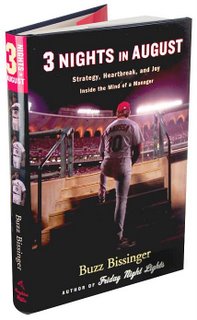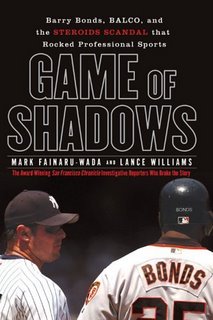Wednesday, March 22, 2006
Book Review: 3 Nights In August
 I picked up 3 Nights in August at my local library the other day (couldn't buy it - I don't have enough money) and sat down to read immediately. When the book came out I was intrigued. I'm a big fan of Buzz Bissinger's work: Friday Night Lights was a tremendous book and really directed the national spotlight on the cutthroat competition that is Texas High School football. Bissinger's next book, A Prayer For the City, is a must-read for anyone interested in the city of Philadelphia's recent past. In both Bissinger really dived into the world of his protagonists, and really cut to the core of who they were. You felt like you were right there with them as they got through life in the City of Philadelphia or as they fought to succeed in high school football. I was also interested that Tony LaRussa so willingly participated in the book. I think LaRussa is a great manager and a good person: anyone who devotes so much charitable time to the cause of animal welfare can't be bad. It is also hard to argue with LaRussa's success with the White Sox, the A's and the Cards. LaRussa's intellectual style always impressed me and made me think that he'd be receptive to the ideas and theories of Moneyball. Another thing that intrigued me were the reviews of 3 Nights, which made the book out to be the anti-Moneyball, the ideological tome of the old guard of the baseball establishment. I was disappointed.
I picked up 3 Nights in August at my local library the other day (couldn't buy it - I don't have enough money) and sat down to read immediately. When the book came out I was intrigued. I'm a big fan of Buzz Bissinger's work: Friday Night Lights was a tremendous book and really directed the national spotlight on the cutthroat competition that is Texas High School football. Bissinger's next book, A Prayer For the City, is a must-read for anyone interested in the city of Philadelphia's recent past. In both Bissinger really dived into the world of his protagonists, and really cut to the core of who they were. You felt like you were right there with them as they got through life in the City of Philadelphia or as they fought to succeed in high school football. I was also interested that Tony LaRussa so willingly participated in the book. I think LaRussa is a great manager and a good person: anyone who devotes so much charitable time to the cause of animal welfare can't be bad. It is also hard to argue with LaRussa's success with the White Sox, the A's and the Cards. LaRussa's intellectual style always impressed me and made me think that he'd be receptive to the ideas and theories of Moneyball. Another thing that intrigued me were the reviews of 3 Nights, which made the book out to be the anti-Moneyball, the ideological tome of the old guard of the baseball establishment. I was disappointed.Eagerly, I dove into 3 Nights. I found the book to be less than a rebuke to Moneyball than a sequel or counter-point of sorts to Men At Work, George Will's 1990 baseball book that heavily featured the thoughts of LaRussa on managing (along with Tony Gwynn on hitting, Orel Hershieser on pitching, and Cal Ripken Jr. on fielding). Will styled Men as an "anti-heroic" book, one that dispensed with The Natural-type view of the game as an epic with the overtones of a Greek tragedy, and approached baseball as a blue-collar enterprise with gritty hard work and little glamour. I found Men At Work to be partly a commentary on how modern conservatism views itself (the voice of the common man, the defender of traditional American values, etc.) and partly an attempt by Will, the thin, bookish pundit, to connect with people he obviously admires but in no way resembles. I liked it but after a while Men's theme became repetitive and dull.
3 Nights revisits a lot of the same ground Will covers, but with a slightly different focus. LaRussa as the master strategist, the soulful general directing his soldiers into battle armed with his wits and guile. This is classic baseball player/manager-as-hero territory. There is a lot of great stuff in the book, but it is largely derivative of Will and other books. The difference between 3 Nights and Men is that Bissinger sees LaRussa as being the great hero of an epic tale, where Will saw him as the hero of the working man.
Moneyball is mentioned in passing in the book's foreward, where Bissinger looks down on sabremetrics as turning coaches and GMs into middle managers. You hear the contempt Bissinger feels when you read that the new-wave GMs "view players as pieces of an assembly line; the goal is to quantify the inefficiences that are slowing down production and then to improve on it with cost-effective player parts." Clearly Bissinger is enthralled with the Greek tragedy aspects of the game: the view of sabremetrics as "assembly line" baseball goes to the heart of Bissinger's work. He sees sabremetrics as cold, impersonal, dehumanizing. Bissinger goes on to talk about how LaRussa is "powerfully influenced by the very persuasions the [new-wave GMs] find so pointless: heart, desire, passion, reactions to pressure. After all, these are emotions, and what point is there playing baseball, or any game, if you don't celebrate them?" Just as Friday Night Lights celebrated the tragedy of high school football in Texas and Prayer celebrated the tragedy of the City of Philadelphia, 3 Nights celebrates the tragedy of baseball.
I admit my bias:
 I believe in sabremetrics. I think Moneyball was right on the money. I think Moneyball will rank amongst the top ten most influential books on baseball ever written, right up there with Ball Four, Juiced and The Lords of the Realm. (Game of Shadows, the new book on Barry Bonds steroid use, will probably rank there as well when the Barry Bonds saga finally plays out.) Like Martin Luther nailing his 95 thesis on the door of the Catholic Church in Wittenberg, Germany in 1517, Moneyball declared war on the old guard of baseball and challenged them to justify their beliefs. Moneyball is the leading book of baseball's Enlightenment, its Protestant Reformation. Bill James probably fits the bill as baseball's Martin Luther, but Lewis' Moneyball reached a broad audience and spread James' ideas to the people.
I believe in sabremetrics. I think Moneyball was right on the money. I think Moneyball will rank amongst the top ten most influential books on baseball ever written, right up there with Ball Four, Juiced and The Lords of the Realm. (Game of Shadows, the new book on Barry Bonds steroid use, will probably rank there as well when the Barry Bonds saga finally plays out.) Like Martin Luther nailing his 95 thesis on the door of the Catholic Church in Wittenberg, Germany in 1517, Moneyball declared war on the old guard of baseball and challenged them to justify their beliefs. Moneyball is the leading book of baseball's Enlightenment, its Protestant Reformation. Bill James probably fits the bill as baseball's Martin Luther, but Lewis' Moneyball reached a broad audience and spread James' ideas to the people.People have siezed upon 3 Nights as the leading tome of baseball's counter-enlightenment. I don't really buy it. It's a nice book, but it is too derivative of what has followed before. It doesn't grapple with the arguments of Moneyball, and when it does it gets them wrong: on page 136 Bissinger states that Moneyball stands for the proposition that OBP is the most important stat in baseball*. Wrong. Moneyball holds up OBP as having been ignored as a stat and the best indicator of a young player's future abilities. Moneyball stands for the proposition that the old guard is too conservative and ignores criticism while holding onto the past because it is tradition. Too many people have seized on Bissinger's general criticisms of sabremetrics and have fingered 3 Nights as the old guard's countershot. There is no ideological statement contained here. 3 Nights is a celebration of baseball as Greek tragedy. So in many respects, it is a better counter-point to Men At Work. It is a celebration of LaRussa's success. Maybe Joe Morgan can sit down and write a book (Why I Hate Bill James And Other Thoughts). But this isn't the Anti-Moneyball.
* At another juncture, Bissinger refers to the Red Sox decision during the '04 season to go with a closer-by-committee strategy. The strategy was endorsed by Bill James, who noted that teams often bring in their relief pitchers at incorrect times: i.e., your best reliever should pitch the eighth if the oppositions 3,4,5 hitters are coming up, and another hurler should close out the game in the ninth against weaker hitters. LaRussa, Bissinger proudly notes, knew that James was wrong based on his 4,000 games of coaching experience. Ah. We'll ignore the fact that James is probably correct anyway: Bissinger mischaracterizes James strategy as endorsing a closer-by-committee approach rather than having your best pitcher pitch the most important inning appraoch, which was what James was really endorsing. It is the only time in the book that James is mentioned.
What is 3 Nights? It is not an ideological reaction to Moneyball. It is not breaking new ground. It is a pleasant, well-written book about an excellant manager, and reflects the viewpoint of its author, a journalist interested in tragic, human stories. It is a good book, but its long-term significance in the realm of baseball history is minimal. Moneyball, I suspect, will be talked about and argued about twenty-five years from now. I don't see the same for 3 Nights.
Comments:
Post a Comment











